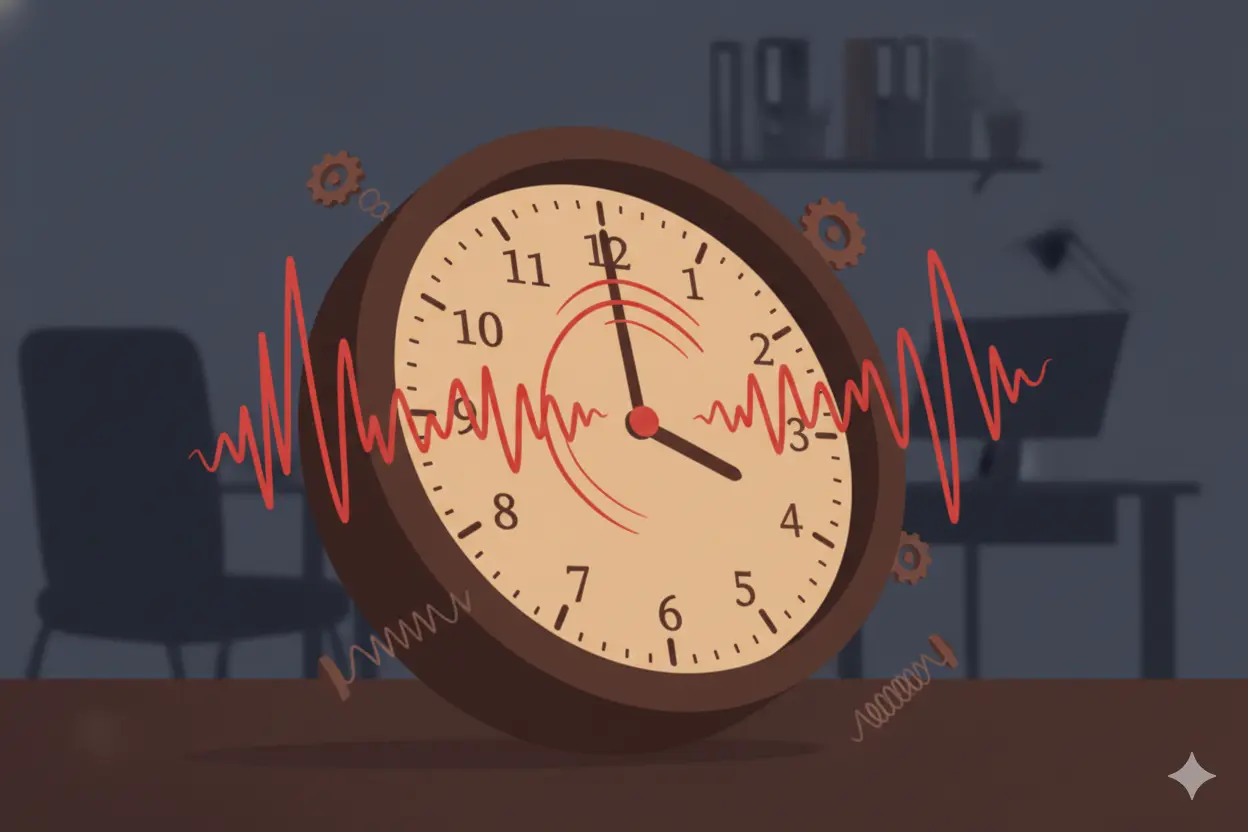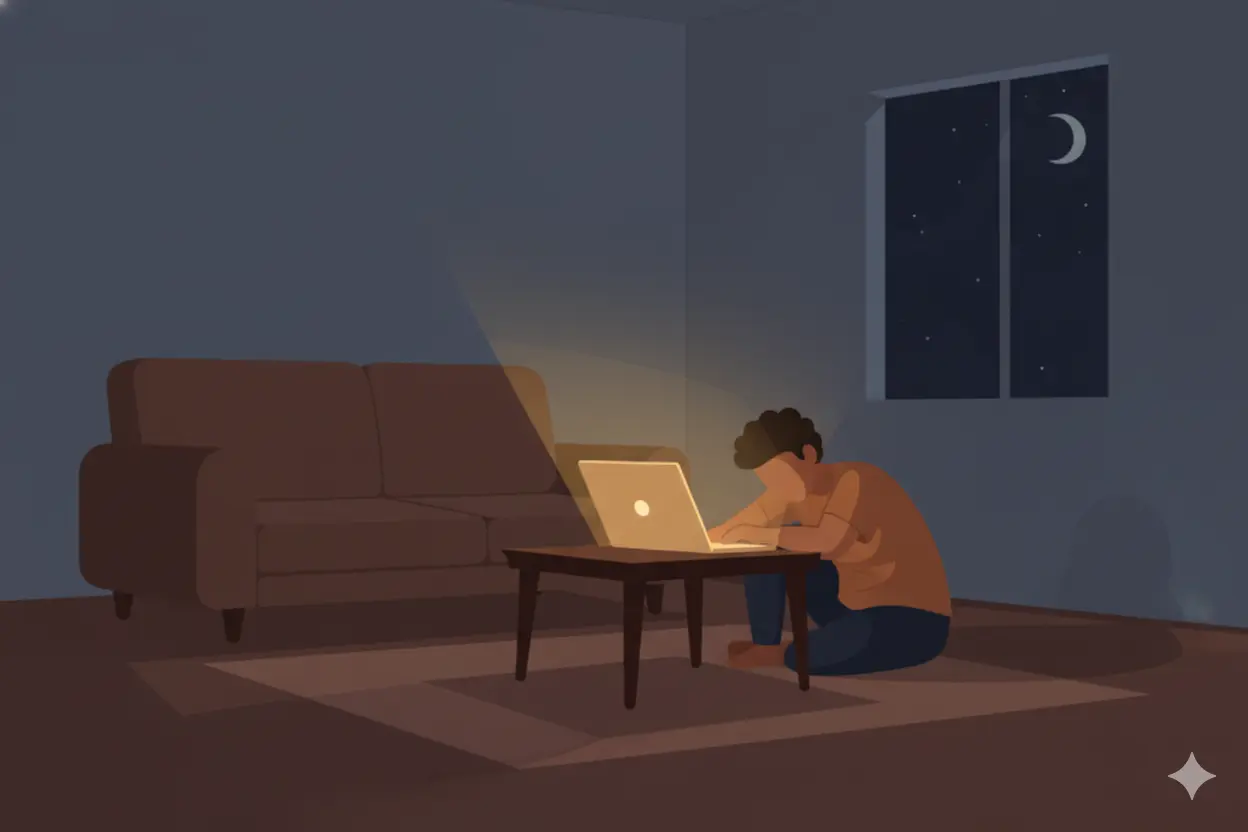It is 11:30 PM. The living room is dark—curtains drawn, overhead lights off, the TV screen a blank rectangle on the wall. But the room isn't completely dark. On my desk, a small green light blinks rhythmically, like a patient heartbeat. And underneath that blinking: a low hum, like a distant swarm of bees, fills what should be silence.
It's my laptop. I closed the lid hours ago—definitely hours ago, maybe around 8 PM after finishing the last email, the last Slack message, the last "quick check" of the document that wasn't really that urgent. But the fan is still spinning. The aluminum case is warm to the touch, almost body temperature. It feels alive. It feels like it's waiting for me, patiently standing guard, ready for me to come back and move a cursor, open a tab, answer one more message, fix just one more thing.
I stand there in the dark, hand resting on the warm metal, listening to that persistent hum. And that's when I realize: for a long time—maybe years—I've been just like that machine. I could close my eyes. I could lay in bed with the blanket pulled up to my chin. I could put my phone face-down on the nightstand. But my internal fan never actually turned off. My mind kept spinning, processing, staying warm, ready to spring back into action at the slightest notification.
The Phantom Hum
We live in a world that praises the "always on" state. We carry computers in our pockets that ding every time someone likes a photo, comments on a post, tags us in something we didn't ask to be tagged in. We wear watches that buzz if we sit still for too long, reminding us that stillness is somehow suspicious, possibly dangerous, definitely unproductive.
I call this the "Phantom Hum." It's that feeling when you're lying in bed, supposedly relaxing, supposedly winding down, but your brain is methodically ticking through a mental checklist of things you haven't done yet. Emails you should have answered. Projects you should have started. Messages you saw but didn't respond to. That one thing someone said three hours ago that you probably should clarify tomorrow.

When I started my career, this hum became a roar. I told myself a simple story: if I worked harder than everyone else, if I was always available, always responsive, always "on," I would be safe. I would be valuable. I would be indispensable. I treated myself like a server that needed 99.9% uptime—as if being human was just a beta version of being a machine.
But here's the thing: unlike servers, humans aren't built for uptime. We are built for cycles—waking and sleeping, working and resting, daylight and darkness. We are built for the sun going down. We are built to power off, fully, completely, without apology.
The "Sleep Mode" Lie
Think about your laptop's "Sleep" mode. The screen goes black, the keyboard stops glowing, the room gets quiet. It looks like it's off. But it's not. It's just suspending its active tasks in memory, keeping everything warm and ready, sipping power from the battery, prepared to spring back to life in a millisecond if you so much as nudge the trackpad. That is how many of us try to rest. We close our eyes. We lie down. We stop moving. But we're not actually off. We suspend our worries, hold them in mental RAM, keep them warm and ready. We don't shut them down. We never fully power off.
The Art of the Hard Reset
One evening, my laptop actually froze. I was in the middle of something—probably something "important," probably something that felt urgent at the time—and suddenly nothing worked. The cursor wouldn't move. The keyboard was dead, unresponsive to every increasingly frustrated keystroke. The spinning rainbow wheel of death appeared, mocking me with its patient rotation.
I tried everything: clicking frantically, pressing every keyboard shortcut I could remember, even talking to it like a stubborn pet that might respond to gentle encouragement. Nothing. Finally, I did the only thing I could do: I held down the power button for ten long seconds, forcing it to give up.
The screen went black. The fan stopped mid-spin. The hum died.
Complete silence.
It was terrifying for a moment—that irrational panic of "what if it doesn't turn back on? what if I just killed it? what if I lost everything?"—but when I pressed the power button again and watched it slowly wake up, everything was different. Faster. Cleaner. Lighter. The machine needed to die completely for a moment to be useful again. It needed a hard reset, not just a sleep.
Sitting there watching it restart, I realized: I needed to do the same. Not a "vacation" where I checked emails by the pool and kept my laptop in the hotel room "just in case." Not a "relaxing evening" where I scrolled mindlessly through social media instead of working. I needed a genuine, complete, terrifying power-down. I needed to force-quit myself.
Learning to Power Down
Shutting down is a skill. Like riding a bike or learning to swim, it feels completely unnatural at first. It feels dangerous, like jumping off a moving train while it's still going full speed. Your brain screams "but what about that thing you were supposed to do? what if someone needs you? what if you forget something important?"
But just like any skill, you can practice. Here is how I started to reclaim the silence, slowly, one small step at a time:
- The physical closing: When I finish work for the day, I don't just close the laptop lid and walk away. That's too easy to undo. Instead, I clean my desktop—actually drag files into folders, close every single tab (yes, all 47 of them), shut down every application. I make it hard to start again. I create friction. I force my future self to make a deliberate choice to reopen everything rather than just clicking and continuing where I left off.
- The transition ritual: I started treating the sunset like a biological signal, the way our ancestors probably did before we invented electric lights and convinced ourselves that 10 PM is a perfectly reasonable time to be staring at spreadsheets. When the sky breathes out, when the light goes golden and then blue, I breathe out. I let the day go. I don't fight it.
- Embracing the dark: I stopped using my phone as a nightlight. I stopped checking "just one more thing" at 11:30 PM. I bought an alarm clock—an actual physical clock that doesn't glow, doesn't connect to wifi, doesn't have apps. It just sits there, quietly ticking, doing one job.

Try This: The 10-Second Shutdown
Tonight, before you go to sleep, try this small ritual. It sounds silly, but it works:
- Sit on the edge of your bed. Not lying down yet. Just sitting. Feet on the floor. Hands in your lap.
- Close your eyes. Let the room disappear.
- Imagine the power button. Visualize it as a glowing button in the center of your chest, right where your sternum is. You can feel it humming, warm, active.
- Hold it down. Place your hand there physically if it helps. Take a deep breath and count backwards from ten. Slowly. Ten... nine... eight... Feel the button pressing in deeper with each number.
- Feel the fans stop. On "one," imagine that persistent hum in your head—the one that's been there all day, maybe all week—finally going silent. The whirring stops. The heat dissipates. The screen goes dark.
- Acknowledge it. Say it out loud if you're alone: "System shutdown complete." You are now "Powered Off." Everything can wait until the next boot-up. Tomorrow morning. Not now.
The world can wait until restart. It always could.
Doing Nothing is Not a Bug
In tech, doing nothing is an error. A frozen screen is a critical problem requiring immediate attention. An unresponsive application is a failure. A system that just sits there, idle, not processing anything? That's broken. That needs to be fixed.
But in life—in actual human life—stillness is a feature, not a bug. Rest is not a malfunction. Silence is not a crash. Doing nothing is not the same as being broken.
It is in the quiet moments—when the fan stops spinning, when the processor stops processing, when the screen finally goes dark—that we actually cool down. It is when we stop taking in new data that we finally process the data we already have. It is when we stop moving that we notice how we feel.
If you feel like that laptop tonight—warm to the touch, fan whirring, glowing alone in a dark room, waiting for the next task—just remember: You are allowed to shut down. Completely. Fully. Without apology or explanation. The work will be there tomorrow. The internet will still be there. The emails will wait. The messages will keep.
Nothing urgent is truly that urgent at 11:30 PM.
🌬️ Find Your Breath
If your internal fan is spinning too fast tonight, if the hum in your head won't stop, try this: I created a simple Breathing Guide that matches your breath to a gentle, steady rhythm. Think of it as forcing your system to idle down, one breath at a time. It's like pressing that power button and counting backwards from ten, but with your lungs instead of your thoughts.
Open Breathing GuideTomorrow Morning
There is nothing dangerous about silence. The world doesn't end when you close your eyes and let the hum finally stop. In fact, the world is waiting for you to come back—fully charged, fans clean, memory cleared, ready to actually function instead of just barely keeping up.
Your laptop knows this. That's why it has a shutdown option. That's why the power button exists.
Maybe it's time we learned from our machines instead of trying to become them. Maybe it's time to hold down that button, count to ten, and let everything go dark for a while.
The restart can wait until morning.
